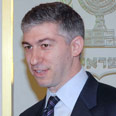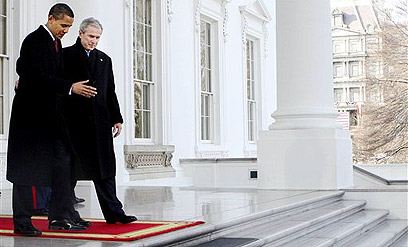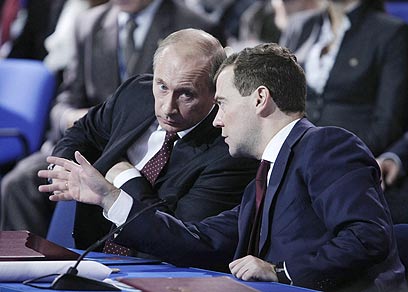
Stuart Levey
Photo: Getty Images
WASHINGTON - Stuart Levey is worried. The man who served as the architect of economic sanctions against Iran
for over six years during the George W. Bush and Barack Obama administrations is not hiding his fears over the fact that focusing on Libya, Yemen and other Middle East hotspots is diverting the attention of US and global leaders from Iran.
In an exclusive interview with Ynet, the first ever Under Secretary for Terrorism and Financial Intelligence within the United States Department of the Treasury says that the challenge is to ensure that Iran will continue to be the focus of attention. At the moment there is no doubt that the Middle East is taking up a great deal of the time and attention of the world's leaders but he adds they mustn't lose focus.
Regional Turmoil
Avi Yesawich
Op-ed: As Arab regimes are toppled, Iranian people will likely aim to do the same soon
Gary Seymour, Obama's advisor for disarmament affairs expressed similar concerns. In a recent radio interview he noted that everyone's attention was on the Arab Spring, the Arab uprisings which divert attention from Iran's nuclear plans to the lack of stability in the Arab world.
Discussing his role Levey says that it was quite a challenge on the outset with but since the position was a new one, with no predecessor to follow, he wasn't operating under the burden of high expectations.

Levey thought term in office would be short due to elections (Photo: AP)
Levey reveals that he had no idea that he would go on to serve in the position for over six years in fact, there was a reasonable chance that he would have only stayed in the position for a few months due to the elections.
When he first started Levey says that he focused on issues like domestically based funding of terror organizations, for example a Hamas foundation working within the US to fundraise for the Hezbollah. Levey notes that he found that it was easier to achieve more by focusing activities throughout the world while using tools developed in the US.
The turning point came in 2005 in North Korea when they located a bank in Macau's Banco Delta Asia for aiding in funding the illegal activities of North Korea. Levey says that the US used their authority in the area to expose the bank, blacklist it and put a stop to its connections with the US, with dramatic impact and consequences.
Global financial systems and other institutions rushed to disassociate themselves from North Korea. The North Korea affair emphasized the dangers of bad conduct that could put companies' reputation at risk not just with the US but with other financial systems as well. From there on in Levey began to develop a plan to apply some of those lessons in Iran.
Dynamic process
Thus, Levey found himself travelling the world seeking out sanction-breakers and warning countries and companies that doing business with Iran would harm their financial relationship with the US and other nations.Levey''s work was obviously easier in countries that had little or no financial interest in Iran, though in some countries like Switzerland and Germany the job was a bit more difficult due to the extensive investments and business relations with Iran.
In 2006-2007 following many meetings, they made the decision to stop doing business with Iran. Levey believes they did so after coming to the conclusion that the risk of doing businesses with Iranian banks was higher.
Just how did Levey convince truculent countries who had business dealings with Iran? By presenting examples proving that Iran was violating the sanctions imposed on it using deceptive conduct by, among other things, changing company names, using shell companies and changing ship names.
You have got to have a dynamic process where you explain not only why these are bad companies to do business with but also show their bad conduct, the negative conduct they're engaging in. The business sector in those countries was shown just how dangerous it was to do business with Iran and that helped in putting the pressure on them to stop says Levey.

Russian cooperation (Photo: AFP)
Using every tool and resource put at their disposal by the US government, including international intelligence agencies and intelligence supplied by US allies, Levey and his team diligently followed the implementation of sanctions against the Islamic Republic and sanctions violators.
Levey says that he went to Israel on many occasions within the framework of his role – not just to discuss Iran but terror as well.
His many trips also took him to China on more than one occasion and while he says China was less eager to put pressure on Iran as a tactical solution to the nuclear problem, eventually the communist country voted in favor of the decision to impose sanctions on Iran in the UN Security Council.
Europe not threatened
Explaining the differences between the attitudes towards the Iranian issue Levey says that while the US and Europe make it clear that the ongoing Iranian deception leaves Tehran with the burden of proof in any financial dealings, China believes otherwise.It was because of China that we couldn't pass as forceful a resolution as we wished to Levey notes.
Meanwhile, he believes that the Russians cooperate and implement the sanctions. Saying that while the media had extensive reports about Russia's business dealings with Iran – it could not even be compared with the trade relations between Iran and China.
Levey also said that outside of the Middle East he didn't find any counties who were concerned over the possibility of a nuclear Iran. Nuclear weapons in Iranian hands are a national security threat to the US but when visiting Europe and presenting maps and missile ranges, the Europeans didn't feel threatened.
The senior US official won't go into the question of how long before Iran becomes a nuclear state but states that Tehran's leadership has very clear intentions that haven't undergone any changes and they are to continue promoting the countries nuclear capabilities.
And what is Washington's response? According to Levey the US government has not yet reconciled itself with a nuclear Iran. The president's policy is that there will not be a nuclear Iran, he adds.
Playing into US hands
That said, he does believe that now is the time to take the sanctions a step further. The system he says has proven itself as effective now pressure on Iran must be increased either through the UN Security Council or through other means.According to Leveythere are certain things playing into US hands with the all-embracing condemnation of the Iranian Revolutionary Guard, currently on the US, the EU, South Korea and Japan blacklist.
Since that is the organization running most of the Iranian economy, most of the focus can be turned against that organization. Their strategy to evade sanctions is playing into US hands to impose sanctions.
The Iranian Revolutionary Guard is not an organization which the Iranian population will rally around. The Revolutionary Guard is repressing the Iranians and robbing them of economic opportunities. This is our opportunity to increase Iran's isolation. It won't be easy but it is possible.
- Follow Ynetnews on Facebook















